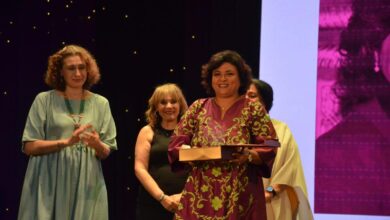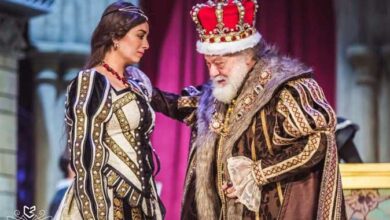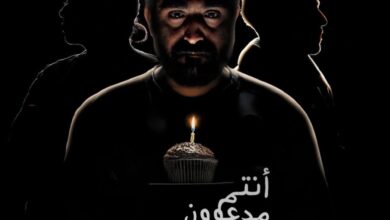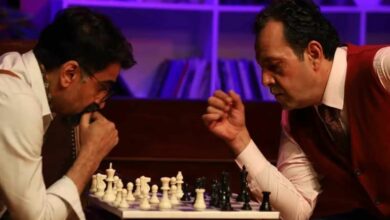
The world is plunged into darkness. Confusion reigns.
Five characters, three men and two women, wander blindly, bumping into one another; they mourn their lives, reminisce, panic, and struggle to find hope. In a sense, the “Time of the Shadow” play, performed in Rawabet Theater as part of the Combo Mostakil Festival, is like five monologues spliced together.
Mostly they talk to themselves, or the audience, or simply exclaim into the darkness. Though there are moments of interaction, when the characters share confusion or argue. It is difficult to get a sense of the different characters, but that does not really matter, as the play is less about five people struggling to make sense of the darkness and the loss of all they knew before, and more about a society collectively plunged into uncertainty.
Theatrically, it is a challenge to create a sense of dark and confusion where all the characters are struck blind. The solution, director Adel Abdel Wahab of the Alexandrian troupe Hiwar finds, is to make the stage dark with the lights at the front turned toward the audience. The glaring light makes it difficult to see, the excess light creating, in effect, a sense of darkness.
Each night of the 10-day Combo Mostakil festival, Rawabet hosts a different musical or theatrical act. The performances vary from the collective compositions of the Choir Project to three women singers – Mai Waleed Yassin, Aya Mustafa, Youssra al-Hawari – performing together for the first time, to “Ebb and Tide” by Tamye that is both a theatrical and musical experience.
The common thread is independent art, whether it's a play like “Time of the Shadow” written in 2011 or “Oscar and Lady Wardiyya” adapted from a French novella written in 2002.
Artists need not wait for funds and the possibility of big production teams or bands to make, produce and perform art, said Curator Salam Yousry on the festival’s opening night.
The festival’s combination of media, with artists of different strengths and talents, grapples with all the kinds of questions art grapples with, but with a fresh urgency and flavor inflected by the context of Egypt’s political and social transition at the start of 2012.
In “Time of the Shadow,” now and then a man in a video appears, sometimes with sunglasses, sometimes blindfolded. He tells us the earth shifts out of its orbit every nine thousand years or so. All methods of communication are down, curfew is imposed, and the only source of light is fires.
The characters have lost all that they knew. For none of them can life go on as before. But they are not equally affected. Some have hope and some are forlorn. Having lost their lives as they knew them, the characters reflect on all that occurred, all that they felt until the moment of rupture when darkness took over. Their different feelings about life before lead them to feel differently about the darkness in which they find themselves.
Throughout the play, there are shifts in mood, rather than a linear narrative. There is a missing of life as it was before. A longing and yearning for all that was lost. For love and intimacy and certainty. A sense that the darkness can only be bad, the absence of what came before it.
For the most part, though, the darkness compels the characters to reflect and to realize that life as it was before, perhaps was not life worth living, or at least not worth yearning for – “people think they are alive, but they're not,” one character says.
When the darkness descended, one character says the only sound he heard were the ticks of his clock. The time between each second seemed to stretch, as the strikes of the clock reminded him of all the time wasted. Another similarly reflects on how he used to wake up to fill each new day with emptiness. How his life was a life of plastic, the relationships, the feelings, all plastic. A woman remembers how she used to live for tomorrow; she realizes that she could never live today. One character learns to live differently in the dark, realizing that before he had only ever seen, he had not used his other senses; he was living incompletely. Now, he has learnt to recognize things by their smell.
In these reflections, the audience is enjoined to think of those philosophical or existential questions that one confronts throughout life, whether by choice or compulsion.
One character finds relief in the darkness, having never been able to escape the scrutiny of others; a scrutiny from which no detail was exempt, even the way he breathed. But he also refuses to believe he is safe in the dark, wondering if those who could keep an eye on him in the light can now do it better in the dark with their senses.
And here lies the question of intent. Although the situation is explained as a natural catastrophe with the earth slipping out of its orbit, the references to the Egyptian revolution are clear and explicit.
The man in the video describes the situation as an explosion of frustration, and not a one-off explosion; it could happen again. While some are panicking in the darkness, one character says it had to happen, that maybe it should have even happened 30 or 40 years ago. Another wonders if the confusion and darkness are deliberate. If “they” did this, he says, it means they want us like this, not seeing or understanding. He approaches the audience, talking without seeing, and touches an audience-member. Suddenly he jumps back, fearful, “I shouldn't be talking to you, you might be one of them.” Elsewhere, someone jokes that soon “they” will announce they have arrested the culprits.
Explicitly and implicitly, official discourse about the state of affairs since last year is directly challenged. What is chaos? Is there chaos, really? Or is it fabricated? Who benefits? Is this sense of chaos and confusion a way to control society after the explosion? And while the word “stability” is not mentioned, the question of chaos versus stability is implicitly raised.
The opposition of the two rests on the idea that we need to return to a stability that existed before. But in their questioning of what went before, the characters question such a desire.
The lights returns. Their immediate reactions are different. But in their actions that follow, it is clear that it is impossible for any of them to go back, knowing what they know now, having experienced what they have.
The rain came, the man in the video says, it washed everything, but then somehow everything was dirtier than it was before, as if there was a collective complicity, a collective responsibility for this return.
When all the old reference points are gone, when all that gave structure and meaning and sense are gone, does one yearn for those reference points, does one seek to recreate them even while knowing their hollowness and inadequacy, or does one search for a new environment, create something else?
As one of the lines in the plays says, “living a historical moment is not easy.”




